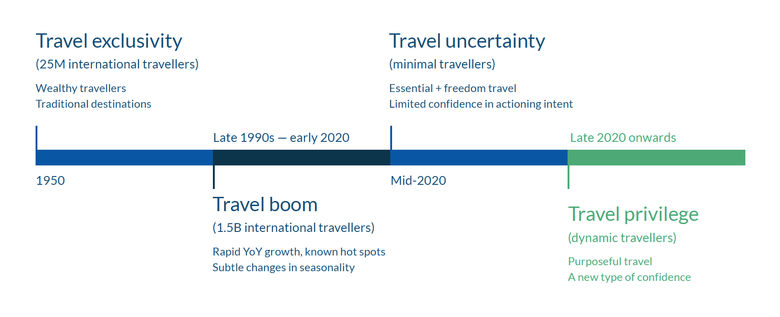For the first time in recent history, the travel industry is learning how to start anew.
It seems that, for now, travel is no longer a booming industry of consumers and endless trips that we can take for granted. SiteMinder’s Changing Traveller Report revealed that the COVID-19 pandemic had negatively affected the financial situation of more than three in four travelers either "a lot" or "somewhat." Yet, more than 85% also said they were likely to take their next domestic trip before the year 2021 was over.
Travel has become a privilege again, for those consciously seeking extraordinary, purposeful and more intimate moments in time. It’s been stripped back to the basic human rights and desires to move, to explore and to question, even under geographical, logistical or financial constraints.
From asking, "How much can I earn from my next guest?", hoteliers are today asking, "When will guests return to my hotel?" However, as we draw near to the end of 2020, the more relevant question to ask is: "How can I reset for the present and future of travel?"

The four eras of travel in the past 70 years
The five stages of the hotel booking reset
While a lot remains unknown, what is evident is that the new behaviors and preferences of today’s traveler are likely to linger, if not become permanent changes for some. It is through SiteMinder’s World Hotel Index that we now know the hotel booking cycle will generally go through five key stages until it resets into a different normal.
- Domestic acceleration
Concrete indicators of lockdowns being lifted this year have been followed by a strong burst of excitement among local residents, who have longed to escape the confines of their homes.
Characteristics: An increase in domestic bookings within a destination with largely closed international borders. - Plateauing
While there’s been a renewed interest in domestic trips, it’s naturally difficult for domestic travel, alone, to see most hotel markets completely return to the levels seen during the travel boom. For this reason, the initial excitement among consumers is followed by a plateauing of hotel bookings.
Characteristics: A decrease in booking momentum, seen after a local surge or rise in COVID-19 causing restrictions. - Flux
Whether it be due to increased cases in coronavirus, or other political or societal challenges - or perhaps a simple die down in euphoria - this stage of destabilization illustrates the very real human behavior of withdrawal.
Characteristics: Irregular booking behaviors, due to threatening restrictions or growing concerns of a rise in COVID-19 cases. - Embracing
Call it comfort or mere acceptance, the fourth stage is all about stabilization with the embracing of new norms. After experiencing the initial burst of excitement, flattening and then flux, locals ultimately arrive at a place where they remain hopeful for full recovery, but welcome the reality that the world is simply different.
During this stage, we will typically see travelers embrace domestic tourism as the new exciting adventure. They may book a trip overseas in anticipation of international borders reopening, but know that they can and will cancel, if needed.
Characteristics: Much less erratic booking behaviors. - International acceleration
While the world is yet to witness the return of this stage (and it may be many months before we do), another, albeit more sustained, acceleration is predicted as international borders reopen. Strong, sustained international acceleration will form the final stage in the road to resetting hotel bookings.
Characteristics: An increase in international bookings following an ease of restrictions for travelers from one or many countries.
The current state of flux
On September 27, the World Hotel Index tells us that hotel bookings globally entered the third stage of flux. The move into the third stage followed two solid months of domestic acceleration around the world and then 12.5 weeks of plateauing between 50 to 55% of 2019 levels.
As of this writing, hotel bookings globally are sitting at 45% year-on-year and, as markets around the world experience second waves of the coronavirus, it’s difficult to know how long this stage will endure. I hope, not long.
The truth is, COVID-19 has been the ultimate equalizer. It has democratized the travel industry like never before, and it is important to reflect on it as such, as every hotel has had to relinquish control. Indeed, hotels now face a travel industry of more discerning guests and shorter lead times. Predictable seasonality is over.
Will the travel industry ever return to the way it was? Perhaps, but in the meantime, it is critical to acknowledge that the hopes and expectations of travelers have evolved, and so, too, must our thinking around what travel is and what it means in today’s world.